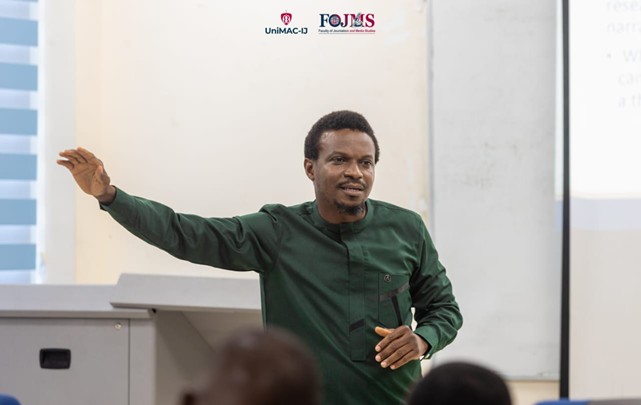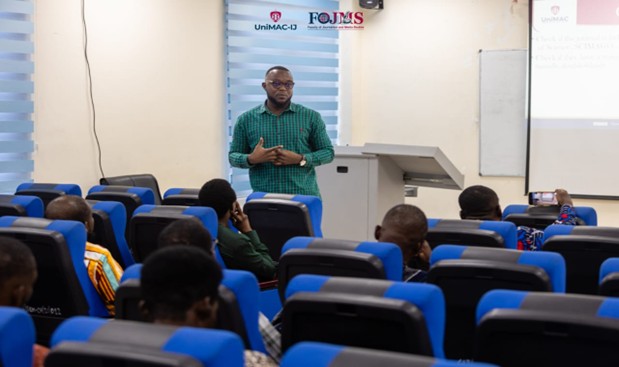The Faculty of Journalism and Media Studies (FOJMS) at the University of Media, Arts and Communication (UniMAC) has held a seminar on how lecturers can develop individual and group research plans to enhance their profiles.
The lecture, which came off on the 20th May 2025, provided scholars an opportunity to deliberate on strategies to publish research papers in reputable academic journals.

The Acting Dean of the faculty, Prof. Etse Sikanku, in his opening remarks, indicated that research remains central to the career of every academic, hence, the need for faculty to embrace the art and explore ways of making it a cornerstone of its agenda. Prof. Sikanku encouraged team work among members of the faculty as an effective strategy of consolidating research gains. He stated that, “a good way to research is to collaborate. The whole idea is to steep all faculty members in research so we will all be on the same level as far as research is concerned.” Professor Sikanku further urged lecturers to identify areas of interest, knowledge and expertise to enhance specialization. “We should all strive to build a research identity and narrative we can be identified with. This comes from consistent publication in key identifiable and related thematic areas. Let us be known for something.” He intimated.

Dr. Noel Nutsugah, a well accomplished Scholar and a Public Relations Lecturer at UniMAC’s Institute of Journalism, presented on the topic, “How to Publish in Credible Academic Journals”. He shared personal insights about publishing research papers and guided participants on what to do for effectiveness. During his presentation, Dr. Nutsugah highlighted the central role such publications played in boosting a scholar’s standing in the academic space. He explained that papers submitted to highly rated journals for publications were routinely rejected, an occurrence he said need not discourage further publications with the statement that, “some of the great articles we read may have been rejected multiple times. And when you are rejected, there is no room for appeal. Do not give up. On my way to come and talk about rejections, I got rejected on a publication.” He light-heartedly shared about a personal experience.
In delivering his closing remarks, Prof. Sikanku pledged “frequent seminars” in the coming months “to assess our goals”.

The seminar was a practical session which presented members of the faculty an avenue for discussing individual and group research plans. Attendees also formed groups for future collaborations. The lecture was attended by lecturers of the faculty and the media.
Research output is an integral part of any thriving University. For UniMAC, a specialised University set to promote professionalism in media, arts and communication, it imperative that faculty embraces the research culture to promote its thought leadership and advocacy in the communication space. Impactful Research is a cardinal of the Vice-Chancellor’s vision – “At UniMAC, we must focus on research that addresses the pressing issues of our time, whether in the areas of media ethics, communication strategies, or improving the creative industry for a cutting-edge dynamic impact globally. Faculty must nurture and mentor junior staff in conducting and publishing trailblazing research.” This Seminar and many others planned advances the implementation of the Vice-Chancellor’s vision for UniMAC.
By: Mitchell Asare Amoamah
